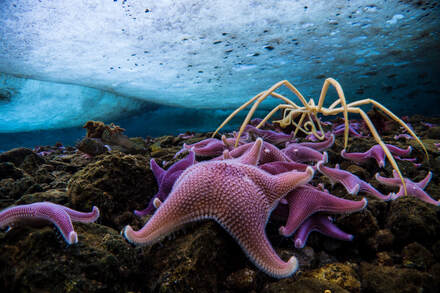|
What did you learn from your experience making this film/program?
Watching wildlife is about the most mindful thing you can do. Sat alone on an Antarctic coastline. There’s no one else for hundreds of miles and no sign of humanity. You’re just watching and listening. Watching the penguins and waiting. Waiting for them to do something. Waiting to film. People ask if it’s challenging or if you need extreme patience, but there’s nothing challenging about it. It doesn’t matter that it’s cold or windy or that it’s icy. I just found it really fascinating to sit from first light at 5am ‘til last light at 9pm, to watch and observe and then to capture a moment and turn it into engaging images to create an inspiring story – that’s about as good as it gets. What impact do you hope this film/program will have? What I really love is the idea that audiences will come and enjoy the film. I want them to feel happy, inspired, and awestruck. BUT I also want people to feel hopeful and uplifted about what can still be done to reverse climate change and biodiversity loss. I also want the audience to take away the profound thought that actually what happens here in Antarctica is really critical for all of us and it’s worth fighting for. Were there any surprising or meaningful moments/experiences you want to share? For one sequence, we were working with some Argentinian scientists and the Argentinian navy who were the most hospitable, friendly people. They fed us every day, they housed us and some nights they danced with us – we were all in our full Antarctic gear wearing huge boots and overalls dancing the tango at the end of the earth. That was a wonderful memory. And of course, the memory of the gorgeous penguins. When the chicks grow up and shed all their fluffy feathers, their parents have left and the young ones then all walk down to the sea to take their first swim. They’re sat next to you waiting to plunge into the icy ocean. During those moments, some of them fall asleep just a couple of meters away – they’re so trusting. That’s a really sweet moment and it makes it all the more heart breaking and nerve wracking when they do finally jump into the sea, and you watch them try to evade the jaws of a massive leopard seal. Did the film team use any unusual techniques or unique imaging technology? We took drones to Antarctica. They allowed us to film behavior that you wouldn’t normally see. We also filmed deep under the ice with timelapse cameras to give a perspective of a rarely seen world. What is your favorite shot and why? There was one incredible animal moment where I suddenly thought, ‘OK, that’s in the film’: A penguin was being chased through the sea by a leopard seal and managed to just escape by leaping out of the water and onto an iceberg. The leopard seal then jumped out of the water too and up onto the iceberg right next to the penguin. The seal began inching closer to the poor little penguin that was just exhausted. And this was happening right in front of us! We were filming the action from drone, from the land and from the water. The leopard seal has its jaws wide open, and the penguin leant forward and tried to peck this huge predator to get it away. Imagine a 30-centimeter-high penguin and a three-meter-long leopard seal – it’s completely David and Goliath! It was so brave and what happened next? Well, I won’t spoil it, you’ll have to see the film. What do you feel is most important to remember when conveying information via film? Not many people get the chance to go to Antarctica, so our goal is to connect to that continent. It’s wild, it’s extraordinary, it’s spectacular. And I hope it’s entertaining and engaging in that respect. But the key thing, especially considering lots of children are going to be watching this film, is to inspire them with hope. The idea that there really are solutions to climate change, to the struggles the natural world is facing, and even in places really far away that you wouldn’t have considered, there are things happening that give us a lot of hope. And that’s what I want people to leave the theater with, feeling like there’s something that can be done. That Antarctica, a frozen continent that’s miles away, is something worth protecting. Something we can still protect.
0 Comments
Leave a Reply. |
Archives
March 2024
Categories
All
|
Contact UsJackson Wild
240 S. Glenwood, Suite 102 PO Box 3940 Jackson, WY 83001 307-200-3286 info@jacksonwild.org |


 RSS Feed
RSS Feed